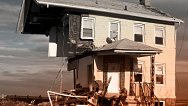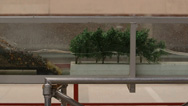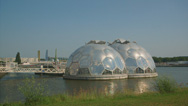Dutch Windmills
- Posted 12.12.13
- NOVA
The iconic Dutch windmills were once state-of-the-art flood control technology. They pumped water from uninhabitable marshes and turned it into farmland, redefining the landscape of the Netherlands. Today, the Dutch have implemented other flood prevention methods, but working vintage windmills still exist. Watch as Peter Paul Klapwyk, a modern day miller, tours a windmill that was build in 1740.
Transcript
Dutch Windmills
December 12, 2013
NARRATOR: In the Netherlands people have always found ingenious ways to live near and below the water.
PETER PAUL KLAPWYK: We’ve always been a country on the edge of the water. We’ve also always lived in a land that gets flooded every now and then.
NARRATOR: Peter Paul Klapwyk is a miller at Kinderdijk, the largest collection of working vintage windmills in Holland. His windmill was built in 1740.
PETER PAUL KLAPWYK: So the windmills in 1450, when they were introduced, enabled us to live in areas where before we couldn’t live. So when we started building dikes, we needed windmills to pump out all the rainwater and all the water coming up from the ground.
NARRATOR: They are iconic and quaint now, but in their day they were the state of the art in flood control technology.
PETER PAUL KLAPWYK: On the outside here are the four sails, two beams holding four sails. And then, if the sails turn, the wheel will turn. This will start spinning and the screw gets turned by the wind.
NARRATOR: It is an Archimedean screw that can lift water up. As the windmills turned, they turned uninhabitable marshes into lush farmland called polders.
The Dutch have not stopped pumping their polders dry ever since. They don’t have a choice. A quarter of the country sits below sea level.
Credits
PRODUCTION CREDITS
- Produced, Written, and Directed by
- Miles O'Brien
- Additional Producing
- Cameron Hickey and Suzi Tobias
- Editor
- Cameron Hickey
- Associate Producer
- Will Toubman
- Photography
- Cameron Hickey
- Original Footage
- © WGBH Educational Foundation 2013
IMAGE
- (main image: Dutch windmill)
- © WGBH Educational Foundation 2013
Related Links
-

Megastorm Aftermath
How can cities prepare for rising seas and raging storms?
-

Judo with Nature
Planting trees in front of dikes is one way to keep large waves from flooding the shore.
-

Reimagining New York
A risk management expert says that we must look to New York's future to prevent flooding.
-

Floating Buildings
Engineers in the Netherlands propose building homes that float on water.

